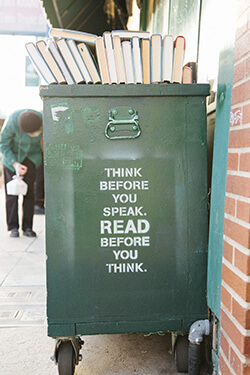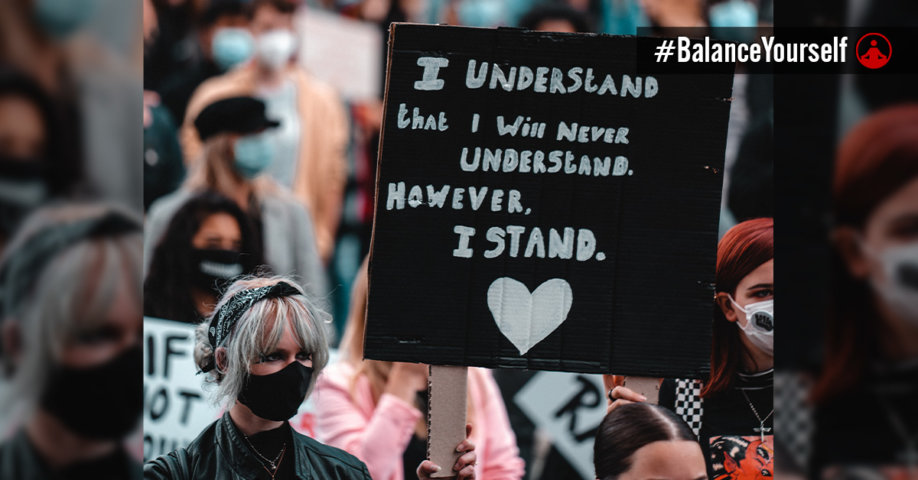Editor’s Note: The following article is from film & television editor Debby Germino (Fargo, Agents of S.H.I.E.L.D., Smallville, Genius), who is also the founder and author of the blog Happiness In Training.
» Click here to download Debby’s “Happiness In Training” Starter Kit
As a white woman who grew up in an upper-middle-class suburb of Boston, I feel uncomfortable writing about racism and white privilege. I do not understand what it’s like to be a black person in this country. I do not understand the hardships and injustices that black people endure daily. I cannot solve the systemic problems that have led to the state of our country today. But I can exercise my compassion as a human being and I can open my heart and my mind to learn how to be Anti-Racist.
I recently had a conversation with my dad who told me the following quote had a deep impact on him:
“You’re Either Racist or Anti-Racist. There’s no in-between.”
As an 86-year-old white man, he’s lived a lot of history. But he admitted that although he hates the injustice black people endure, he never realized how it affected his life. He’s now understanding the hard truth of the statement “you’re either racist or anti-racist” and that it’s no longer an option to watch from the sidelines.
This fight for justice is about all of us. It’s time for us to take a hard look at our own actions and inactions that are contributing to the problem. The quiet outrage and then return to the status quo is no longer sustainable or acceptable. Black lives have been devalued, degraded, and unjustly persecuted for far too long. Human rights are not color-coded. The only requirement is to be human. When human rights are taken away, it hurts all of humanity. We are hurting and it’s time to stop hiding from the hurt and address it head-on.
We must be willing to embrace discomfort and make mistakes in service of this movement. My fears of saying the wrong thing, inadvertently offending someone, or revealing an unconscious bias have kept me from speaking out in the past. These fears seem trivial next to the lives of George Floyd, Ahmaud Arbery, Breonna Taylor, Sean Reed, Nina Pop, Tony McDade, and countless others who’ve been senselessly killed because of their skin color.
I do not expect, need, or require sympathy for dealing with these fears. But admittance, acknowledgment, and recognition of them is the only way towards change. Because underneath all the anger, hatred, and injustice, is fear. Fear is the root of the problem. And it takes courage to admit fear. It’s much easier to mask it in anger, hatred, or denial.
Until now, it’s been easier for me to think the problem isn’t about me and that I would never behave so monstrously towards another human being. But the truth is, I don’t know how I’d behave in these situations. Would I be like Amy Cooper and act completely irrational at a black man approaching me in the park? I hope not. I hope that I would treat any human with the respect and dignity that I would want my own family to be treated. But have I tested myself to see that I measure up to the expectations I hold in my mind?
This an opportunity to examine my own underlying beliefs, biases, and values. This is an opportunity to wake up, stop watching in disgust and horror, and take an active role in making change. We all need to take responsibility for our role in this struggle. We all need to lend our humanity, courage, and compassion so that we can be confident we will uphold our beliefs when tested in real life.
It’s one thing to write these words, but it’s another to follow through. I’m still uncertain of exactly how I can help. I know the starting point from which action begins is listening. Listening both externally and internally. Listening externally to the voices speaking out against racism. And listening internally to my own fears and hidden emotions that are hindering my ability to speak out and act bravely in alliance of my deepest values.
Listening to Others
 In order to understand the black experience, we need to learn about the struggles and brutalities that black people live with daily. We need to hear the stories of oppression and unrest that they endure. We need to take a look at the privileges we have received that enabled their oppression and we need to take responsibility for our place in it.
In order to understand the black experience, we need to learn about the struggles and brutalities that black people live with daily. We need to hear the stories of oppression and unrest that they endure. We need to take a look at the privileges we have received that enabled their oppression and we need to take responsibility for our place in it.
In school, we are taught white history. If we are lucky, we get a small dose of black history during February when it’s black history month. And then it’s right back to white people.
Reading books written by black people telling their stories and learning their history is important to understand the struggles they face. It’s a way to show we care and we are interested in hearing their words and voices. It’s also a way to find a connection through our human experience. Understanding their history gives us perspective on their feelings, attitudes, and behaviors. It shows we respect them enough to spend our time and energy learning about them.
Once we learn more about the lives of black people, we next have to take the crucial (and painful) step to learn about our own privilege. We have to humble ourselves because we don’t know what we don’t know. And the truth is not pretty.
We’ll wish we could go back to how it used to be. But that is white privilege.
We have to move forward and do the hard work. What does this look like?
- Committing to educating ourselves about white privilege.
- Taking workshops, classes, or listening to speakers on the topic.
- Finding other like-minded white people that can support us during this process.
None of this will be easy, but it’s absolutely necessary if we want to make a change.
As a film and tv editor, I have been contemplating my own contributions to the content that gets put out into the world. I have always wanted to be a part of stories and documentaries that share an important message and bring awareness to relevant issues like racism. The work is so much more fulfilling when it can make a difference and touch the heart. I wonder what impact it might have if we all chose projects that matched our own social and moral agendas?
Start where it feels easiest and most manageable. We have unlimited access to books, articles, podcasts, websites, movies, and television shows where we can learn about black stories, white privilege, and the harmonious intersection of all cultures. We first have to learn about our differences so we can come together and hold respect for those differences and unite in our commonalities.
Here are some suggestions:
Books Written by Black People
How to Be Anti-Racist by Ibram X. Kendi
Intersection Allies: We Make Room For All by Chelsea Johnson, LaToya Council, & Carolyn Choi
Friday Black by Nana Kwame Adjei-Brenyah
Love and Rage: The Path of Liberation Through Anger by Lama Rod Owens
Articles Written by Black People
How to Make This Moment The Turning Point for Real Change by Barack Obama
Dismantling White Supremacy and the Five Stages of Grief by Kim Crayton
20 Actions White people & non-Black POCs in Corporate (and otherwise) can take to show up for Black People right now by Michael J.A. Davis
An Anti-Racist Reading List by Ibram X. Kendi
Movies/Shows About Black Injustice
Podcasts/Talks on Race
10 Percent Happier: An Uncomfortable Conversation on Race
Tim Wise- Anti-Racist Writer, Speaker and Eductor talks at Insight LA in February
White Privilege Books
Colorblind : The Rise of Post-Racial Politics and the Retreat from Racial Equity by Tim Wise
White Fragility: Why It’s So Hard for White People to Talk About Racism by Robin DiAngelo
Between Barack and a Hard Place: Racism and White Denial in the Age of Obama (City Lights Open Media) by Tim Wise
Listening to Yourself
 Once the education begins and we learn of the rampant abuse, neglect, and hatred, we have to hunker down for the emotional s*@! storm that erupts. The shame, guilt, horror, disgust, and sadness that remains will invoke a myriad of reactive responses.
Once the education begins and we learn of the rampant abuse, neglect, and hatred, we have to hunker down for the emotional s*@! storm that erupts. The shame, guilt, horror, disgust, and sadness that remains will invoke a myriad of reactive responses.
This is where the real work begins. We cannot allow our old patterns to take hold. We cannot put up the armor that we’ve worn for all these years.
As a white woman, my armor has allowed me to take a back seat and disengage from the injustice that is so blatantly happening all around me. My instinct is to look away, avoid, run, and protect myself from the horror and the pain that black people are experiencing. This reaction only increases the suffering we all experience.
The antidote to suffering is compassion. In his book, Eight Mindful Steps to Happiness, Bhante Henepola Gunaratana describes how self-compassion serves as the motivation to help others.
“Self compassion grounded in wholesome self love, motivates us to reach out sincerely to help…Firefighters show a good example of this motivation…they do not carelessly rush into the flames, unequipped to deal with the dangers of the situation. Instead, they take every precaution, putting on helmets and heavy gear, making careful plans, and relying on their judgment and skill to determine the best way to save others without endangering themselves. In the same way, we clothe ourselves with compassion and loving-friendliness toward ourselves, purifying our motives to the best of our abilities and allowing our minds to become clear and bright. From that pace of clarity, we can help others effectively and also encourage our own spiritual progress.”
It may seem selfish to direct love and compassion to ourselves, but the example of the firefighters reveals just how essential this is for us to respond effectively.
In Theravada Buddhism, there is a specific mediation practice for compassion. It is similar to loving kindness meditation, where you sit and silently repeat phrases directed at yourself and others in your life. But the compassion practice asks us to think of a person, or group of people that are suffering and direct phrases of compassion to them.
Some traditional phrases used are:
I care for this suffering.
May this suffering be eased.
May this suffering cease.
These phrases can be adapted to your own preferences, to what feels natural and relevant to you. The idea is to acknowledge that suffering is there and develop compassion and understanding so that the heart can open and we can gather the strength necessary to skillfully engage with the suffering.
Zen Buddhism has a similar practice called tonglen which translates to “sending and taking”. In this practice, you sit in meditation, and on the inhale you imagine taking in the suffering of others, and on the exhale you send out compassion and relief to those suffering. American Buddhist nun, Pema Chodron describes why and how this practice is useful in this article on Lion’s Roar.
Usually, we look away when we see someone suffering. Their pain brings up our fear or anger; it brings up our resistance and confusion. So we can also do tonglen for all the people just like ourselves—all those who wish to be compassionate but instead are afraid, who wish to be brave but instead are cowardly.
In each of these practices, the intention is to develop both self-compassion and compassion for others. These practices will help to build courage, strength, and resilience as we work to confront our deeply held fears and biases. On the surface, they may seem inconsequential. You might wonder how sitting in silent meditation can help dismantle white supremacy. But meditation helps wake us up to the present moment. It helps us see the patterns in our minds and brings awareness of the subtle thoughts that influence our behaviors.
Once we see clearly, we recognize the universal truth that all beings are connected. Martin Luther King Jr. wrote of this truth from his Birmingham jail cell.
“Injustice anywhere is a threat to justice everywhere. We are caught in an inescapable network of mutuality, tied in a single garment of destiny. Whatever affects one directly, affects all indirectly.”
Meditation helps us see this truth which helps us act with compassion and bravery to mend the suffering, heal the wounds, and be the change agents that are necessary to build a fair and equal world for all people.
Listening is Just the Beginning
Listening, educating, and meditating will not solve the world’s racism problems. They are merely a starting point for those of us who feel helpless and scared to attack a large, systemic, and historic problem that’s been alive for centuries. As a white person, it is my responsibility to recognize my privilege, learn about the experiences of black people, take care of my own emotions, and actively engage in anti-racism policies and agendas so we can create a world where it’s no longer dangerous to have dark-colored skin.
The days of ignoring, denying, or running from racism are over. If we are not helping to solve the problem, we are part of the problem. We have to join the conversations, get used to feeling uncomfortable and use our privilege to support black causes. Please join the discussion and let me know what actions you’re taking to become Anti-Racist.
Resources to use and organizations to support:
NAACP Legal Defense and Educational Fund

